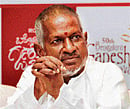When it comes to music, look no further than the magical tunes of one of the celebrated music directors of the Indian music industry — Ilaiyaraaja, writes C V aravind.
His simple attire, spartan habits and spiritual leanings aptly gel with the title ‘Isaignaani’ (sage of music) by which Ilaiyaraaja is popularly known in the Tamil film industry. Raaja has also been honoured with the sobriquet ‘Raagadevan’ (lord of the ragas). The soft-spoken composer, a gold medalist from the Trinity College of Music, London, has been one of the most prolific baton wielders the film industry has ever known, and in over three decades has composed music for over 950 films, marking an output of over 4,500 songs, a good number of which have been chart busters. Raaja, who will be composing music for a Punjabi film for the first time, has worked in Tamil, Malayalam, Kannada, Telugu, Hindi and Marathi films. Recently, he regaled audiences with a concert to mark the release of his latest venture Nee Thaane En Pon Vasantham, directed by Gautam Menon. In fact, the veteran musician gave Menon a pleasant shock by composing all the songs for the film in just one hour. The songs have already gone viral on the net and the record number of hits are an indication that the master composer has been in top form.
Rise to the top
Ilaiyaraaja’s story is a classic rags-to-riches story — the musician’s climb to the top has been steep and he had to endure considerable hardship before finding a foothold in cinema. Raaja and his brothers performed as a travelling troupe for quite a while, before Raaja’s proficiency in guitar caught the attention of composers like Salil Choudhury and G K Venkatesh, well known names at that time. It was producer Panju Arunachalam who gave him his first solo break in the black-and-white film Annakilli and the young composer rose to the occasion with a score that could have done a veteran proud.
Since then, Raaja’s career has soared and his association with directors like Balachander, Bharathiraaja, Balu Mahendra, Mahendran, Mani Ratnam, K Vishwanath, Bala, and even new directors like Suseendran and Prakash Raj, have given his career a distinct fillip.
Raaja received the unique distinction of having one of his numbers in the film Dhalapathi — Rakkamma kaiya thattu — adjudged among the best 10 songs in a BBC-conducted survey, covering numbers from as many as 155 countries. Popular numbers that are being hummed by his legion of fans even to this day include Kanne kalaimaane, Shenbhagame, Maanguyile poonguyile, Panivizhum malarvanam, Kathoram lolaaku, Poove sembuve, Rojavai thalaatum, Then paandi seemayile and Poongaatru thirumbuma. Raaja has also won four National Awards for ‘Best Music Director’ for films like Sindhu Bhairavi, Saagara Sagamam and Rudra Veena and one for ‘Best Background Score’ for the Malayalam film Pazhassi Raaja. Ilaiyaraaja has also scored the music for several Malayalam films including Adoor Gopalakrishnan’s Nizhalkuthu, Sathyan Anthikaad’s Kochu Kochu Santhoshangal, Hariharan’s Pazhassi Raaja and also for films like Kadha Thodarumbol and Bhagyadevatha.
In Telugu, apart from the films of Vishwanath, Ilaiyaraaja has also scored music for films like the mythological Sri Rama Rajyam, which were well received. Although his commitments in Tamil cinema keep him occupied most of the time, Raaja has also done a few Kannada films including Hare Rama Hare Krishna and Prasad. In Hindi cinema, his output has been limited to films like Sadma (a remake of the Tamil hit Moondram Pirai), Shiva and the two films directed by Balki — Cheeni Kum and Paa.
Ilaiyaraaja was the first composer in Tamil cinema to blend western music with rural folk. Though most of his earlier films revolved around rural themes, he nonetheless managed to make optimum use of western instruments. Ilaiyaraaja has composed music to the lyrics written by most well-known lyricists in all languages including Vaali, Vairamuthu, Naa Muthukumar, Sreekumaran Thampi, Kaithapram, etc. He is also one of the very few professionals in the industry who, with just one glance at a scene, can compose entire songs for the film. He contends that he takes on a film only if he is inspired by the script.
Ilaiyaraaja, who is the first Indian to conduct the Royal Philharmonic Orchestra, which performed his full symphony, also has to his credit best-selling albums like ‘How To Name It?’ and ‘Nothing But Wind’. Raaja was also one of the composers whose music featured in the medley in the London Olympics.
While Ilaiyaraaja’s younger brother Gangai Amaran has won acclaim as a lyricist, composer and director, his three children have also been in the thick of things with his second son Yuvan Shankar Raaja being among the most prolific and his daughter Pavatharini, who has won a National Best Playback Singer Award, also composing for films. Although there are many who feel that Rehman has stolen Raaja’s thunder, the fact remains that Ilaiyaraaja continues to be the first choice for a whole lot of directors, who feel that for offbeat tunes, Raaja is the best bet. Further, there has never been a time in all these years, where the music director’s compositions have not been able to find favour with the audience. As long as he has millions of admirers all over the world, Raaja’s magic is not going to wane.

